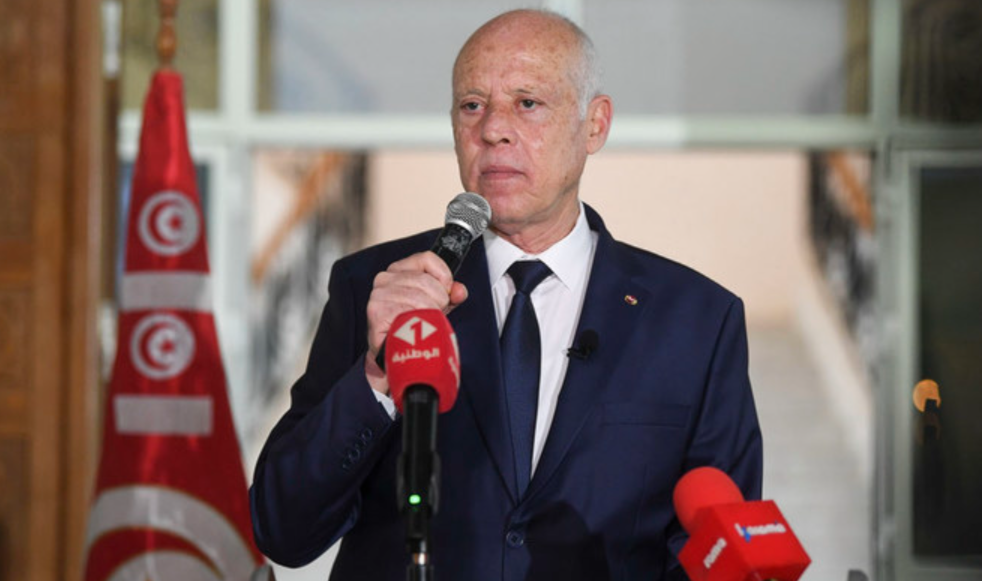Tunisia's Saied replaces ministers in sudden reshuffle
The presidential election is scheduled for October 6, 2024, amid ongoing economic and political crises in Tunisia.
-

Tunisian President Kais Saied waves to Tunisian citizens as he delivers a speech during his visit to Sidi Bouzid, Tunisia, Monday, September 20, 2021. (AP)
Tunisian President Kais Saied changed many ministers on Sunday, including those in the foreign and defense departments, according to a statement posted on Facebook without explanation.
The sudden change removed 19 ministries and three state secretaries, only days after Saied dismissed the former Prime Minister.
"This morning, August 25, 2024, the President of the Republic has decided to make a governmental change," the message added, without divulging details.
The presidential election is scheduled for October 6, 2024, amid ongoing economic and political crises in Tunisia. The latest development was the dismissal of Prime Minister Ahmed Hachani by President Saied on August 8, followed by the appointment of Social Affairs Minister Kamel Madouri as the new Prime Minister.
However, although he is seeking office, some of his political opponents and detractors are now imprisoned or facing prosecution.
Earlier this week, Human Rights Watch (HRW) reported that Tunisian authorities "have prosecuted, convicted, or imprisoned at least eight prospective candidates" for the October election.
Tunisia: electoral commission approves three presidential candidates
The Independent High Authority for Elections in Tunisia announced on August 11, the acceptance of three candidates, including the current president, Kais Saied, who is seeking a second term.
In a press conference, the head of the authority, Farouk Bouasker, stated that the authority accepted the names of President Saied, the Secretary-General of the People's Movement Zouhair Maghzaoui, and the former deputy and head of the Azmoun Movement, Al-Ayachi Zammal. Bouasker added that the authority accepted the three candidates out of 17 applications, while the remaining files were rejected due to a "lack of sufficient endorsement signatures or failure to meet the regional distribution requirement."
On the other hand, several candidates accused the Ministry of Interior of not providing them with a "criminal record certificate," which is considered an important document to complete their files. They claimed this was a deliberate attempt to exclude them, though Bouasker clarified that "no application was rejected due to the absence of the criminal record certificate."
To be eligible for the presidency, candidates must secure endorsements from ten parliamentarians or 40 locally elected officials or gather 10,000 voter endorsements, with at least 500 endorsements in each electoral district. Additionally, the candidate must obtain a criminal record certificate.
The electoral law allows excluded candidates to appeal to the courts before the final list of candidates is announced at the beginning of September.
It is worth noting that Saied's bid for re-election has been met with widespread criticism from the opposition, who accuse him of intimidating his competitors to pave the way for his second term. This comes after his suspension of parliament, annulment of the 2014 constitution, and concentration of all powers in his hands.
The secretary-general of the Tunisian People's Movement, Zouhair Maghzaoui, announced his candidacy for the upcoming presidential race on July 23rd. He stated that his electoral program focuses on improving the public health and education sectors and reintegrating Tunisia into its Arab and Maghreb environment and its African depth.

 3 Min Read
3 Min Read








